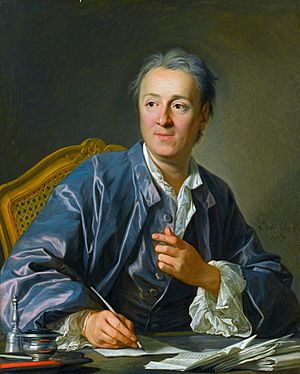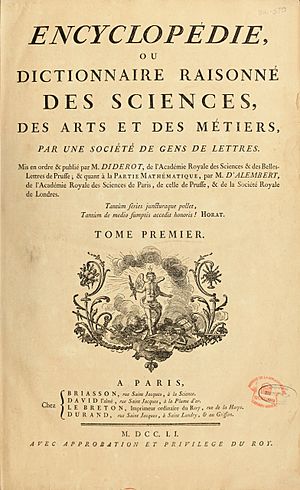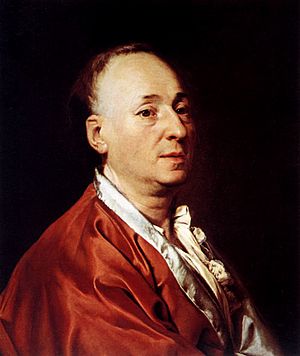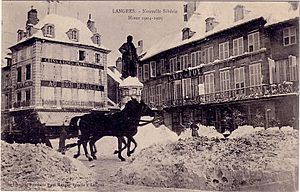Denis Diderot facts for kids
Quick facts for kids
Denis Diderot
|
|
|---|---|

Diderot, by Louis-Michel van Loo, 1767
|
|
| Born | 5 October 1713 Langres, Champagne, Kingdom of France
|
| Died | 31 July 1784 (aged 70) Paris, France
|
| Alma mater | University of Paris |
| Spouse(s) |
Antoinette Champion
(m. 1743) |
| Era | 18th-century philosophy |
| Region | Western philosophy |
| School | Encyclopédistes French materialism Epicureanism |
|
Main interests
|
Science, literature, philosophy, art |
| Signature | |
 |
|
Denis Diderot (born October 5, 1713 – died July 31, 1784) was an important French thinker, art critic, and writer. He is best known for helping to create and edit the Encyclopédie with Jean le Rond d'Alembert. Diderot was a key person during the Age of Enlightenment, a time when new ideas about reason and science became very popular.
Early Life and Education
Denis Diderot was born in Langres, a town in France. His father, Didier Diderot, was a skilled cutler, which means he made knives and other cutting tools. Denis was one of three children who grew up, along with his sister Denise and brother Pierre-Didier. Denis admired his sister Denise very much.
Diderot started his schooling at a Jesuit college in Langres. In 1732, he earned a Master of Arts degree from the University of Paris. For a short time, he thought about becoming a priest or studying law. However, by the early 1740s, he decided he wanted to be a writer and translator instead. Because he chose this path, his father stopped supporting him financially. For about ten years, Diderot lived a free and independent life, focusing on his writing.
Diderot's Major Works
Diderot's early work included translating books, like a history of Greece and a medical dictionary. In 1745, he translated a book called Inquiry Concerning Virtue and Merit and added his own thoughts to it.
The Encyclopédie Project

In 1751, Diderot and Jean le Rond d'Alembert started their most famous project: the Encyclopédie. This was a huge collection of knowledge, like a giant dictionary or an early version of Wikipedia. It was special because it was the first encyclopedia to include articles from many different writers, and it also explained how mechanical arts (like crafts and trades) worked.
The Encyclopédie had a modern way of thinking. It questioned some traditional religious ideas, which made both the church and the government upset. In 1758, the Catholic Church banned it. The French government also banned it in 1759, but this ban was not always strictly enforced. Because of these problems, many writers left the project, and some were even put in jail. D'Alembert left in 1759, leaving Diderot as the only editor. Diderot wrote about 7,000 articles himself! He kept working on the Encyclopédie until 1765. Even though he felt a bit discouraged by the end, the Encyclopédie is seen as a very important book that helped lead to the French Revolution.
Later Life and Support
Diderot often struggled with money during his career. He didn't get much official recognition in France. However, his luck changed in 1766. Empress Catherine the Great heard about his money problems. She paid him 50,000 francs to be her librarian. He kept this job for the rest of his life and even visited her court in Saint Petersburg for a few months in 1773 and 1774.
Many of Diderot's most important writings, like Jacques the Fatalist and Rameau's Nephew, were only published after he died.
Scientific Ideas
Diderot continued to write about science throughout his life. He was very proud of his book Memoires sur differents sujets de mathematique (1748). This book contained new ideas about sound, tension, and how air affects moving objects. He even designed a new type of organ. Other publications of his time praised his scientific work and his clear writing style.
Diderot believed that everything in nature was connected. He wrote, "Everything changes; everything passes; nothing remains but the whole." He thought that molecules were always changing. He also had ideas about how minerals and living things were part of a continuous range. His ideas about nature's flexibility were similar to the later discovery of evolution.
Other Important Writings
Even though the Encyclopédie was his biggest project, Diderot wrote many other works filled with new and creative ideas. His writings ranged from lighthearted pieces to deep philosophical discussions. For example, D'Alembert's Dream (written in 1769) is a philosophical conversation where he explores ideas about what matter is made of and the meaning of life. His novel Jacques le fataliste (written between 1765 and 1780) was very unusual for its time. It challenged how traditional novels were structured and what they contained.
Art Criticism

Diderot's close friend, Friedrich Melchior, Baron von Grimm, started a newsletter in 1753. In 1759, Grimm asked Diderot to write about the art exhibitions held at the Louvre in Paris. Diderot wrote about these art shows, called "Salons," from 1759 to 1771, and again later.
Diderot's art reports became very famous. People said he helped them see art in a new way and understand the meaning of colors. One writer, Anne Louise Germaine de Staël, said that before Diderot, she only saw dull colors in paintings, but his imagination made them come alive.
Diderot also wrote an essay on painting where he shared his ideas about beauty in art. The famous writer Johann Wolfgang von Goethe called it a "magnificent work." Diderot's favorite artist was Jean-Baptiste Greuze. He liked Greuze's emotional paintings.
Ideas on Theatre
Diderot wrote plays that were meant to be emotional and realistic, like Le Fils naturel (1757) and Le Père de famille (1758). He also wrote essays about theatre. He suggested a new type of play, called the 'serious genre'. This was a realistic style that was somewhere between a comedy and a tragedy, different from the formal plays popular at the time.
In 1758, Diderot came up with the idea of the fourth wall. This is an imaginary "wall" at the front of the stage that the audience looks through to see the play. He also wrote Paradoxe sur le comédien (Paradox of the Actor). In this essay, he argued that great actors don't actually feel the emotions they are showing. They are simply very skilled at pretending. This essay is also where the French phrase l'esprit de l'escalier comes from. It means thinking of the perfect thing to say too late, after the moment has passed.
Death and Legacy
Diderot passed away in Paris on July 31, 1784. He was buried in the Église Saint-Roch. His large library was sent to Catherine the Great in Russia. Even though he was a very important figure, he has not been buried in the Panthéon with other famous French people.
Influence on Others
In the century after his death, many famous writers and thinkers admired Diderot. These included Balzac, Delacroix, and Schopenhauer. The philosopher Comte believed Diderot was the most important thinker of his time. Historian Michelet called him "the true Prometheus" and thought Diderot's ideas would stay important for a long time. Karl Marx even said Diderot was his "favourite prose-writer."
See also
 In Spanish: Denis Diderot para niños
In Spanish: Denis Diderot para niños
- Contributions to liberal theory
- Diderot effect
- Encyclopedist
- Encyclopédistes
- Euler, Leonhard
- List of liberal theorists
- Society of the Friends of Truth
- Paris Diderot University
- Denis Diderot House of Enlightenment
Images for kids
 | Janet Taylor Pickett |
 | Synthia Saint James |
 | Howardena Pindell |
 | Faith Ringgold |






